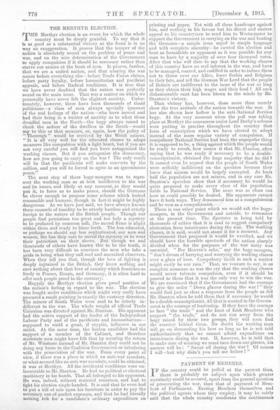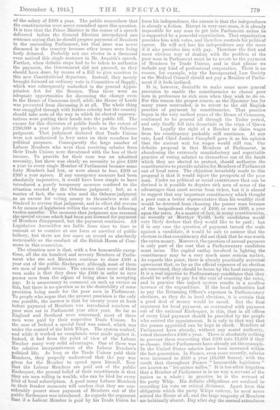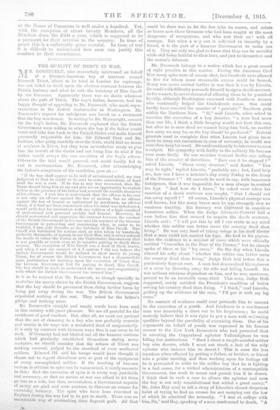PAYMENT OF MEMBERS.
IF the .country could be polled at the present time, there is probably no subject upon which greater unanimity could be secured, apart from the general question of prosecuting the war, than that of payment of Mem- bers of Parliament. Barring Members themselves and the political agents whom they employ, it may be safely said that the whole country condemns the continuance of the salary of £400 a year. The public remembers that the constituencies were never consulted upon this question. It is true that the Prime Minister in the course of a speech delivered before the General Election interpolated one sentence saying that he should propose payment of Members in the succeeding Parliament, but that issue was never discussed in the country because other issues were being hotly debated. Probably not one elector in a thousand even noticed this single sentence in Mr. Asquith's speech. Further, when definite steps had to be taken to authorize the payment, the Government did not proceed, as they should have done, by means of a Bill to give sanction to this new Constitutional departure. Instead, they merely brought forward an ordinary vote in Committee of Supply, which was subsequently embodied in the general Appro- priation Act for the Session. Thus there were no adequate opportunities for discussing the change even in the House of Commons itself, while the House of Lords was prevented from discussing it at all. The whole thing was smuggled through with furtive celerity lest the country should take note of the way in which its elected represen- tatives were putting their hands into the public till. The excuse for this diversion of public funds to the extent of £250,000 a year into private pockets was the Osborne judgment. That judgment declared that Trade Unions were not authorized to levy rates on their members for political purposes. Consequently the large number of Labour Members who were then receiving salaries from their Trade Unions were threatened with the loss of their income. To provide for their case was an admitted necessity, but there was clearly no necessity to give £400 a year to every single Member of Parliament because some forty Members had lost, or were about to lose, £200 or £300 a year apiece. If any emergency measure had been absolutely imperative, it would have been simple to have introduced a purely temporary measure confined to the situation created by the Osborne judgment ; but, as a matter of fact, the men who used the Osborne judgment as an excuse for voting money to themselves were all resolved to reverse that judgment, and in effect did reverse it.by means of legislation within the course of the following twelve months. The moment that judgment was reversed the special excuse which had been put forward for payment of Members disappeared, but the payment continues. All Legislative Assemblies are liable from time to time to commit or to connive at one form or another of public bribery, but there are few cases on record so absolutely inexcusable as the conduct of the British House of Com- mons in this connexion.
The situation now is that, with a few honourable excep- tions, all the six hundred and seventy Members of Parlia- ment who are not Ministers continue to draw £400 a year out of the public Exchequer, although, most of them are men of ample means. The excuse that some of these men make is that they draw the £400 in order to save poorer- men from the odium of being alone in accepting pay. It is unnecessary to comment on such an excuse as this, but there is no question as to the desirability of some provision being made for the poor men in Parliament. To people who argue that the present provision is the only i one possible, the answer is that for twenty years at least before payment of Members was introduced numbers of poor men sat in Parliament year after year. So far as England and Scotland were concerned, most of these men were paid by their respective Trade Unions. In the case of Ireland a special fund was raised, which was under the control of the Irish Whips. The system worked, and while it worked no complaints were made against it. Indeed, it had from the point of view of the Labour Member many very solid advantages. One of these was the relative inexpensiveness of the Labour Member's political life. As long as the Trade Unions paid their Members, they properly understood that the pay was given for the Member to spend upon himself. Now that the Labour Members are paid out of the public Exchequer, the general belief of their constituents is that they are men rolling in wealth, who can be bled for every kind of local subscription. A good many Labour Members tur their franker moments will confess that they are con- siderably poorer since payment of Members out of the public Exchequer was introduced. As regards the argument that if a Labour Member is paid by his Trade Union he loses his independence, the answer is that the independence is already a fiction. Except in very rare cases, it is already impossible for any man to get into Parliament unless he is supported by a powerful organization. That organization provides him with votes, and therefore controls his political career. He will not lose his independence any the more if it also provides him with pay. Therefore the first and most obvious way of dealing with the problem of the poor man in Parliament must be to revert to the payment of Members by Trade Unions, and in that phrase we include any kind of professional corporation. There is no reason, for example, why the Incorporated. Law Society or the Medical Council should not pay a Member of Parlia- ment if it feels inclined.
It is, however, desirable to make some more general provision to enable the constituencies to choose poor men in preference to rich men when they wish to do so- For this reason the proper course, as the Spectator has for many years contended, is to revert to the old English practice of payment by. constituencies. That practice began in the very earliest years of the House of Commons, continued to be general all through the Tudor period, and only finally fell into desuetude in the reign of Queen Anne. Legally the right of a Member to claim wages from his constituency probably still continues. At any rate, Lord Chief Justice Campbell gave it as his opinion that the ancient writ for. wages would still run. Our definite proposal is that Members of Parliament, in abandoning the extremely unsatisfactory and regrettable practice of voting salaries to themselves out of: the funds which they are elected to protect, should authorize the constituencies to provide salaries for Members of Parliament out of local rates. The objection invariably made to this proposal is that it would injure the prospects of the poor man. Under no political or social contrivance that can be devised is it possible to deprive rich men of some of the advantages that must accrue from riches, but it is absurd to suggest that any important constituency which thought a poor man a better representative than his wealthy rival would be deterred from choosing the poorer man because of the insignificant charge of £400, or even £600, a year upon the rates. As a matter of fact, in many constituencies, as recently at Merthyr Tydfil, both candidates would very likely declare that they would like to be paid ; but if in any case the question of payment turned the scale against a candidate, it would be safe to assume that the electors in that constituency did not think that he was worth the extra money. Moreover, the question of annual payment is only part of the cost that a Parliamentary candidate must incur. The capital outlay involved in fighting the constituency may be a very much more serious matter. As regards this point, there is already practically universal agreement that, so far as the official expenses of an election are concerned, they should be borne by the local ratepayers. It is a real injustice to Parliamentary candidates that they should be asked to pay for the cost of counting the votes, and in practice this unjust system results in a needless increase of the expenditure. If the local authorities had to pay the Returning Officer's expenses in Parliamentary elections, as they do in local elections, it is certain that a good deal of money would be saved. But the final argument for local payment, as contrasted with payment out of the national Exchequer, is this, that in all offices of every kind payment should be provided by the people who control the appointment. It is only in that way that the person appointed can be kept in check. Members of Parliament have already, without any moral authority, voted themselves £400 a year. There is absolutely nothing to prevent them converting that £400 into £1,000 if they so choose. Other Parliaments have already sot the example. In the United States salaries have been increased within the last generation. In France, even more recently, salaries were increased to £600 a year (15,000 francs), with the result that throughout France " honourable legislators " are known as " les quinzc mulles." It is too often forgotten that a Member of Parliament is in no way a servant of the nation as a whole ; in practice he is the servant of his party Whip. His definite obligations are confined to recording his vote on critical divisions. Apart from this obligation which the party Whips enforce, he need never attend the House at all, and the large majority of Members are habitually absent. Day after day the normal attendance at the House of Commons is well under a hundred. Yet, with the exception of about twenty Members, all the Members draW the MO a year, which is supposed to be a payment for their services to the country. In time of peace this is a sufficiently gross scandal. • In time of war it is difficult to understand how men" can justify this conduct to their consciences.






















































 Previous page
Previous page